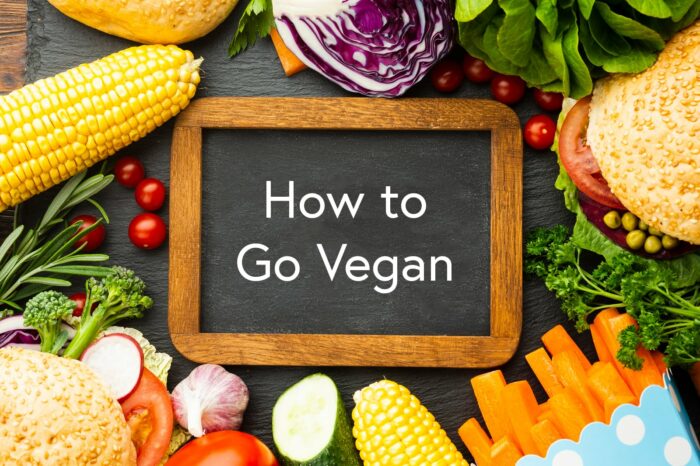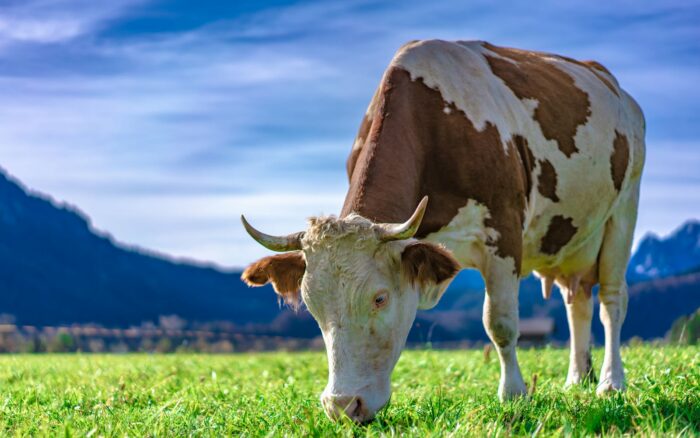What is a Vegan?
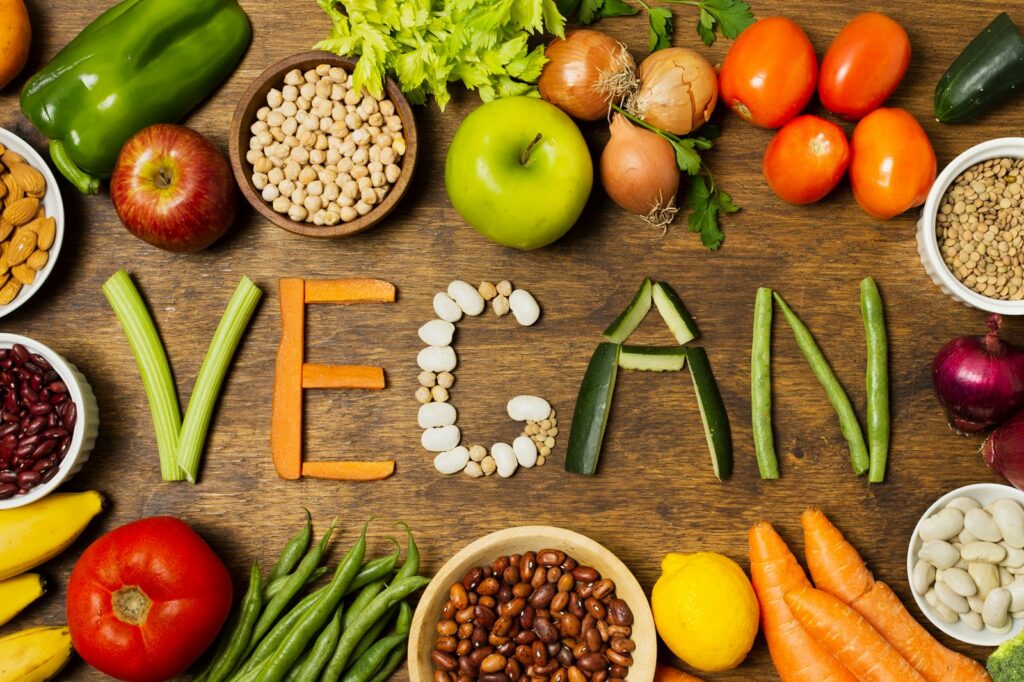
Have you heard that the number of vegans in the United States has quadrupled in the past five years? Being vegan is more than just a dietary choice—it’s a lifestyle that promotes animal rights, environmental sustainability, and personal health. So, what exactly does it mean to be a vegan, and how can this lifestyle positively impact both your well-being and the world around you?
Being vegan means you don’t eat any animal products or any foods that derive from animals. It also means abstaining from consuming animal products such as meat, dairy, eggs, and honey. Instead, vegans opt for a plant-based diet rich in fruits, vegetables, grains, nuts, and seeds. You might be wondering, why go vegan? This dietary choice not only reduces harm to animals but also has numerous health benefits, like lowering the risk of heart disease, diabetes, and certain types of cancer.
Moreover, veganism extends beyond food choices to encompass a commitment to reducing one’s environmental footprint. Animal agriculture is a leading cause of deforestation, water pollution, and greenhouse gas emissions. By choosing plant-based alternatives, vegans help promote sustainability and combat climate change.
In adopting a vegan lifestyle, individuals align their actions with their values of compassion and respect for all living beings. This conscious choice fosters a sense of interconnectedness with the world and encourages mindful living.
By choosing to be vegan, you not only prioritize your health and well-being but also contribute to a more ethical and sustainable world. Joining the growing community of vegans means taking a stand for a brighter future for animals, the environment, and yourself.
What is a Vegan?
What is veganism? Vegans are individuals who choose to live a lifestyle that avoids exploitation and cruelty to animals. They follow a plant-based diet, excluding animal products and products tested on animals.
The vegan lifestyle extends beyond food choices to include advocacy for animal rights and ethical eating practices. Vegans prioritize sustainability by opting for plant-based alternatives in all aspects of their lives to minimize harm to animals.
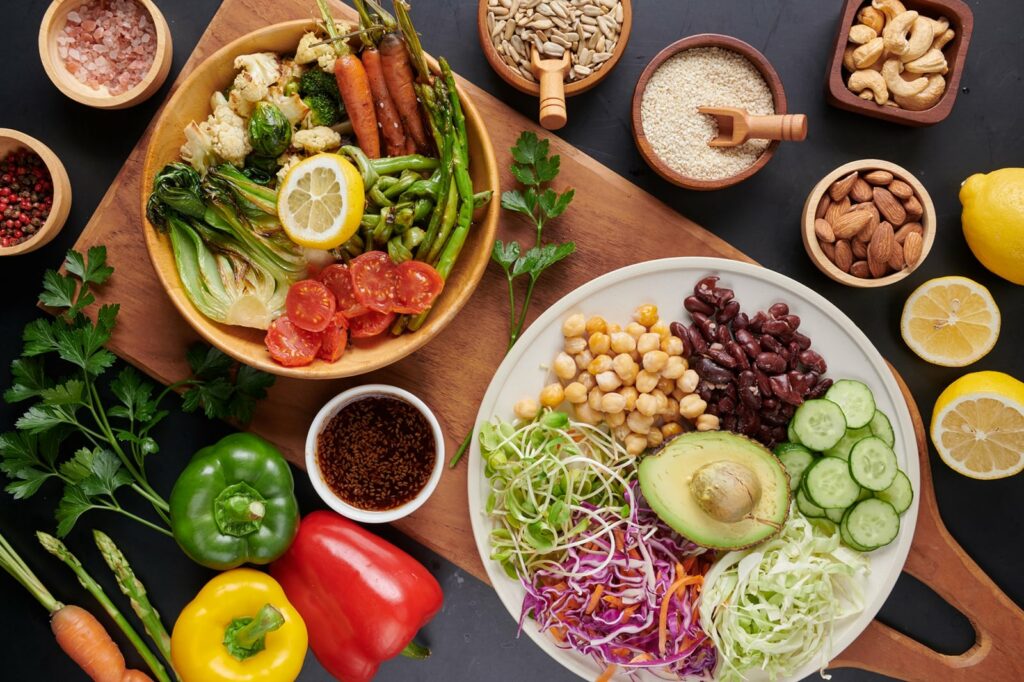
Vegan Diet and Nutrition
What is a vegan diet? A vegan diet excludes any food formulated without ingredients produced by or derived from animals.
Proper nutrition is essential for maintaining good health on a vegan diet. It’s important to ensure you’re getting all the necessary nutrients to support your well-being. Key nutrients to focus on include calcium, iron, vitamin B12, and omega-3 fatty acids.
Calcium is crucial for strong bones and can be obtained from sources like green leafy vegetables, fortified drinks, tofu, and sesame seeds. Iron is important for energy production and can be found in pulses, wholemeal products, fortified cereals, and dark leafy greens. Vitamin B12, essential for nerve function, can be sourced from fortified breakfast cereals, soya drinks, yeast extract, and nutritional yeast flakes. Omega-3 fatty acids, important for brain health, can be obtained from ground linseed oil, vegetable oil, chia seeds, hemp seeds, and walnuts.
Since plant-based iron isn’t as easily absorbed as iron from meat, incorporating nuts and dried fruits into your diet can be beneficial. Additionally, consider supplementing with vitamin D through sunlight exposure, fortified spreads, cereals, or supplements to support bone health.
Incorporating a variety of fruits, vegetables, and fiber is also important for heart health on a vegan diet. By ensuring you’re getting all the essential nutrients and maintaining a balanced diet, you can thrive on a vegan lifestyle.
What Do Vegans Eat and Avoid?
When people choose to follow a vegan diet, they typically avoid foods that come from animals, such as dairy, eggs, and honey. Instead, they focus on eating a wide range of plant-based foods like fruits, vegetables, legumes, nuts, seeds, grains, and vegetable oils. This plant-centered way of eating reflects concerns about animal welfare and also offers various health benefits, such as reducing the risk of diseases, helping with weight management, and decreasing inflammation in the body.
Health Benefits of a Vegan Diet
A vegan diet offers various health benefits, such as supporting weight management and reducing the risk of heart disease by lowering cholesterol levels.
It’s essential for vegans to pay attention to protein sources like soy products, seitan, and lentils, as well as vitamin B12 from fortified cereals and supplements.
Essential fatty acids can be obtained from whole grains, leafy greens, and nuts, while iron sources include black-eyed peas, tofu, and dried fruits.
Vitamin D can be acquired through sunlight exposure, fortified orange juice, and soy products.
Transitioning to a vegan diet can be facilitated by discussing dietary changes with a partner, maintaining a list of preferred vegan foods, setting achievable goals, and finding vegan options in regular grocery stores.
Remember to communicate your dietary changes clearly, set realistic expectations, and include frozen produce in your vegan diet for a smooth transition.
Vegan Food List
Vegans choose to avoid animal products and instead focus on a variety of plant-based foods in their diet. This includes a range of fruits, vegetables, legumes, nuts, seeds, grains, and vegetable oils. These plant-based ingredients serve as the building blocks for a vegan food list, offering numerous options for creating delicious and nutritious meals.
Here is an entire vegan food list:
- Fruits: all fruits like apples, bananas, berries, citrus fruits, mangoes, etc.
- Vegetables: all vegetables like leafy greens, broccoli, carrots, potatoes, mushrooms, beans, lentils, peas, etc.
- Grains: wheat, rice, oats, quinoa, barley, buckwheat, etc. Make sure they are not processed with animal products.
- Nuts and seeds: almonds, walnuts, cashews, sunflower seeds, pumpkin seeds, chia seeds, hemp seeds, etc.
- Legumes: lentils, beans, peas, soybeans, peanuts, chickpeas, etc.
- Tofu and tempeh: made from soybeans, great alternatives to meat.
- Seitan: made from wheat gluten, used as a meat substitute.
- Plant-based milks: almond milk, soy milk, oat milk, cashew milk, coconut milk, etc. Make sure they are unsweetened and unflavored.
- Plant-based yogurt: coconut yogurt, almond yogurt, soy yogurt, etc. Check the ingredients.
- Plant-based cheese: made from nuts, soy, etc. Many brands available.
- Plant-based protein powder: soy, rice, pea, hemp, etc. Great for smoothies.
- Plant-based ice cream: made from coconut, almond, oat, soy, etc. Many dairy-free options.
- Plant-based butter/spreads: made from vegetable oils with no dairy.
- Condiments: ketchup, mustard, relish, hot sauce, etc. Check ingredients.
- Herbs and spices: all fresh and dried herbs, black pepper, salt, garlic, onions, etc.
- Oils: olive oil, coconut oil, avocado oil, vegetable oil, nut oils, seed oils, etc.
- Beverages: water, tea, coffee, plant-based milk, fresh juices, plant-based protein shakes, etc.
- Sweets: maple syrup, agave nectar, fruit jams, dark chocolate, etc. Check ingredients.
Types of Vegan Diets
There are many different types of vegan diets that can help you achieve your goals and make you feel better. Here’s a complete list of the types of vegans.
Whole-food vegan diet
The whole-food vegan diet emphasizes the consumption of unprocessed plant-based foods to promote optimal health and well-being.
This diet focuses on whole grains, fruits, vegetables, nuts, seeds, and legumes while avoiding processed foods like refined sugars and flours.
High-protein vegan diet
Considering an adequate intake of protein is crucial for maintaining muscle mass and overall health, a high-protein vegan diet focuses on plant-based sources to meet your nutritional needs.
Legumes, tofu, tempeh, seitan, nuts, seeds, and certain grains like quinoa are excellent sources of protein in this diet. Incorporating a variety of these foods can help ensure you’re getting all the essential amino acids required for optimal health.
Raw vegan diet
To explore the benefits and considerations of a raw vegan diet, understanding its principles and potential impact on your health is essential.
This diet primarily consists of uncooked, unprocessed plant-based foods like fruits, vegetables, nuts, and seeds. Advocates claim that raw foods retain more nutrients, enzymes, and antioxidants.
However, it’s important to ensure adequate intake of certain nutrients like vitamin B12, iron, and protein on a raw vegan diet.
Mediterranean vegan diet
Exploring the Mediterranean vegan diet reveals a plant-based eating pattern inspired by the traditional dietary habits of countries bordering the Mediterranean Sea. This diet prioritizes fruits, vegetables, whole grains, legumes, nuts, seeds, and olive oil.
It emphasizes fresh, seasonal produce and moderate consumption of plant-based proteins like beans and lentils. Research suggests that this diet may offer various health benefits, including improved heart health and weight management.
Vegan keto diet
The Vegan keto diet is a plant-based eating approach that focuses on high-fat, low-carb foods to promote weight loss and metabolic health.
By restricting carbohydrates and emphasizing healthy fats like avocados, nuts, and seeds, this diet aims to induce ketosis, a metabolic state where the body burns fat for energy.
It can be challenging for vegans due to limited plant-based protein sources, requiring careful planning to meet nutritional needs.
Junk-food vegan diet
Characterized by a reliance on processed and unhealthy vegan-friendly foods, the junk-food vegan diet is a type of plant-based eating pattern that prioritizes convenience over nutritional quality.
This diet often includes vegan versions of fast food, sugary snacks, and pre-packaged meals. While convenient, it may lack essential nutrients like fiber, vitamins, and minerals, leading to potential health risks if followed long-term.
It’s important to balance convenience with whole, nutrient-dense foods.
Low-carb vegan diet
Shifting focus to the Low-carb vegan diet, this plant-based eating approach emphasizes reducing carbohydrate intake while still deriving nutrients from vegan sources.
By incorporating foods like non-starchy vegetables, nuts, seeds, tofu, and plant-based oils, followers aim to control blood sugar levels and promote weight loss.
While challenging, this diet can be balanced with careful planning to ensure essential nutrient intake and overall health.
Gluten-free vegan diet
Opt for a Gluten-free vegan diet if you’re looking to eliminate gluten from your plant-based eating approach while still deriving necessary nutrients from vegan sources. This diet excludes wheat, barley, and rye, common sources of gluten, and emphasizes gluten-free grains like quinoa, rice, and corn.
Ensure to read labels carefully and choose naturally gluten-free foods to maintain a balanced and nutritious gluten-free vegan diet.
Vegan diabetic diet
If you’re managing diabetes and following a vegan lifestyle, the Vegan diabetic diet offers a plant-based approach to help regulate blood sugar levels effectively.
This diet focuses on whole grains, fruits, vegetables, legumes, and nuts while limiting refined sugars and carbohydrates.
Alkaline vegan diet
When considering different types of vegan diets, the Alkaline vegan diet stands out for its focus on consuming alkaline-forming foods that promote overall health and well-being.
This diet emphasizes fruits, vegetables, nuts, seeds, and legumes while limiting acidic foods like processed products and refined sugars.
Advocates suggest that maintaining a balanced pH level in the body through this diet can help prevent chronic diseases and enhance vitality.
Vegan anti-inflammatory diet
The Vegan anti-inflammatory diet focuses on incorporating plant-based foods known for their anti-inflammatory properties to support overall health and reduce inflammation in the body.
By emphasizing fruits, vegetables, nuts, seeds, and whole grains rich in antioxidants and phytonutrients, this diet may help combat chronic inflammation linked to various health conditions.
Including foods like berries, leafy greens, turmeric, and walnuts can promote a balanced inflammatory response in the body.
Nutritarian vegan diet
Transitioning from the Vegan anti-inflammatory diet, the Nutritarian vegan diet emphasizes nutrient-dense plant-based foods to optimize health and well-being.
This diet focuses on consuming foods rich in vitamins, minerals, and antioxidants, such as leafy greens, berries, nuts, seeds, and whole grains.
High-fiber vegan diet
Curious about how a high-fiber vegan diet can benefit your health and well-being?
High-fiber vegan diets are rich in fruits, vegetables, whole grains, legumes, nuts, and seeds, providing essential nutrients and promoting digestive health.
The high fiber content helps regulate blood sugar levels, lower cholesterol, and support a healthy weight.
Incorporating a variety of fiber-rich foods can enhance your overall wellness on a vegan diet.
SOS-free vegan diet
Exploring a SOS-free vegan diet can offer a unique approach to plant-based eating. It focuses on eliminating salt, oil, and sugar for improved health and wellness. By avoiding these ingredients, you can potentially lower blood pressure, reduce the risk of heart disease, and manage weight more effectively.
This diet encourages the consumption of whole foods like fruits, vegetables, legumes, and whole grains to support overall well-being.
Environmental vegan diet
To further expand your understanding of vegan diets, exploring the environmental vegan diet offers a focus on sustainability and ethical considerations in addition to health benefits.
This diet emphasizes consuming plant-based foods that have minimal impact on the environment, such as locally sourced produce and organic ingredients.
Intuitive eating vegan diet
The Intuitive eating vegan diet focuses on listening to your body’s hunger and fullness cues while adhering to a plant-based eating approach.
This diet emphasizes eating when you’re hungry and stopping when you’re full, rather than following strict meal plans or calorie counting.
Ayurvedic vegan diet
When considering the Ayurvedic vegan diet as a part of your plant-based eating journey, you align with the principles of Ayurveda to promote holistic well-being through mindful food choices.
This diet emphasizes balancing your doshas (energies) through whole, unprocessed foods, herbs, and spices.
Macrobiotic vegan diet
Embracing the principles of balance and whole foods, the macrobiotic vegan diet offers a holistic approach to plant-based nutrition. It emphasizes locally sourced grains, legumes, vegetables, and seaweed.
This diet encourages mindful eating, focusing on chewing food thoroughly and enjoying each bite. By promoting the consumption of natural, unprocessed foods, the macrobiotic vegan diet aims to support overall health and well-being through balanced nutrition.
Fruitarian diet
As you explore vegan diets, the Fruitarian diet stands out for its focus on consuming primarily fruits, seeds, and nuts. This diet emphasizes raw and unprocessed foods, providing essential vitamins, minerals, and antioxidants.
While it can be rich in nutrients, it may be low in certain essential nutrients like protein, calcium, and vitamin B12. It’s important to carefully plan a Fruitarian diet to ensure all nutritional needs are met.
Starch-based vegan diet
One popular variation of a vegan diet is the Starch-based vegan diet, which focuses on incorporating a variety of starchy foods as the main source of energy and nutrients. Foods like potatoes, corn, rice, and legumes form the basis of this diet.
Starchy foods provide essential carbohydrates, fiber, and some protein. It’s important to complement this diet with a variety of fruits, vegetables, and plant-based proteins for balanced nutrition.
Low-calorie vegan diet
When following a low-calorie vegan diet, it’s essential to focus on consuming nutrient-dense plant-based foods to support overall health and well-being. Opt for foods like leafy greens, berries, legumes, and whole grains. These options are rich in vitamins, minerals, and fiber while being low in calories.
Remember to consult with a healthcare provider or a dietitian to ensure you meet your nutritional needs while on a low-calorie vegan diet.
Vegan Lifestyle and Ethics
Living a vegan lifestyle involves consciously avoiding the consumption of animal products and actively seeking out cruelty-free alternatives in all aspects of daily life. Ethics play a central role in the vegan community, where compassion towards animals drives the commitment to minimizing harm and promoting well-being.
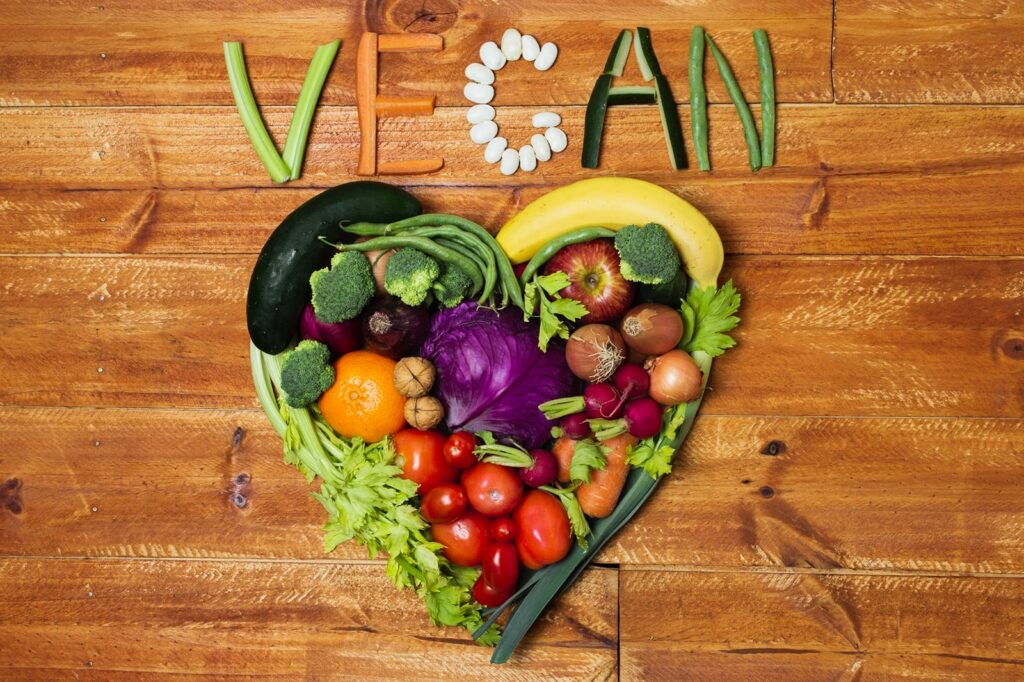
By adopting a holistic approach to living, vegans make ethical choices that align with intentional living practices, ensuring their actions support animal welfare and ethical values. Through choosing cruelty-free options and abstaining from products that exploit animals, individuals in the vegan community advocate for a lifestyle that reflects empathy and care for all sentient beings.
Engaging in ethical living practices, such as supporting causes that promote well-being and participating in vegan communities, allows vegans to live intentionally and contribute to a more compassionate world through their everyday choices.
History of the Vegan Movement
The vegan movement has deep historical roots dating back to ancient Indian and Mediterranean societies that advocated for flesh-avoidance, laying the foundation for the development of vegetarianism over the centuries. Pythagoras of Samos, around 500 BCE, promoted vegetarianism, echoing similar beliefs in Buddhism, Hinduism, and Jainism.
In 1732, the Ephrata Cloister promoted vegetarianism alongside celibacy. The first vegetarian society emerged in England in 1847, followed by the American Vegetarian Society in 1850 founded by Rev. Sylvester Graham.
The term ‘vegan’ was coined by Donald Watson in 1944, highlighting the focus on protecting oneself from tainted food. By 2005, there were 250,000 vegans in Britain and 2 million in the U.S. The movement gained momentum with support from celebrities like Moby, Woody Harrelson, and Fiona Apple, aligning veganism with the animal-rights movement.
Despite its growth, challenges such as nutritional considerations have led many adherents to turn to fortified foods and supplements to maintain a balanced diet.
How to Transition to a Vegan Lifestyle
Transitioning to a vegan lifestyle involves educating yourself about the principles of veganism and making dietary adjustments to embrace a plant-based way of living. To begin, take the time to learn about veganism and its benefits, including ethical, environmental, and health aspects. Explore resources such as documentaries, books, and online communities to deepen your understanding.
Understanding vegan nutrition is key to ensuring a balanced diet. Familiarize yourself with plant-based sources of protein, iron, calcium, and other essential nutrients. Incorporate a variety of whole grains, beans, nuts, seeds, fruits, and vegetables into your meals to meet your nutritional needs.
Discovering vegan products and ingredients will make your transition smoother. Look for plant-based alternatives to animal products like milk, cheese, and meat. Explore vegan-friendly restaurants and grocery stores in your area to find delicious and convenient options.
When adjusting your diet, focus on incorporating a variety of foods to ensure you’re getting all the nutrients you need. Experiment with tofu, tempeh, and other plant-based protein sources. Try out different non-dairy milks, yogurts, and cheeses to find your favorites.
Stay motivated throughout your transition by reminding yourself of the positive impact of veganism on your health, the environment, and animals. Embrace the ethical reasons behind your choice to go vegan and let these values guide your food choices.
Maintain a positive mindset by exploring new and exciting vegan recipes. Get creative in the kitchen and try out international vegan dishes for a diverse culinary experience. Veganize your favorite meals by finding plant-based alternatives that satisfy your cravings.
Plan your transition with flexibility, allowing yourself occasional non-vegan exceptions if needed. Address any barriers or challenges you encounter along the way and seek support from friends, family, or online vegan communities. Remember, transitioning to a vegan lifestyle is a journey, and every step you take makes a difference.
